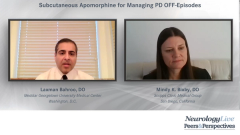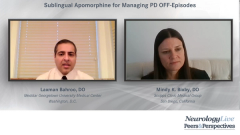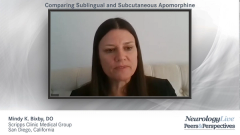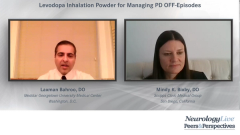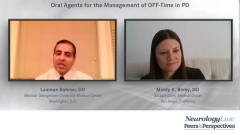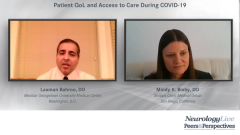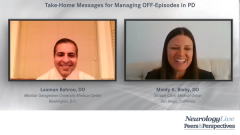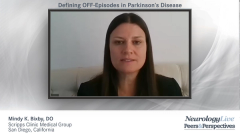
Patient QoL and Access to Care During COVID-19
Key opinion leaders in Parkinson’s Disease discuss the importance of improving quality of life and access to care when managing OFF episodes for patients during COVID-19.
Episodes in this series

Laxman Bahroo, DO: What is the impact on patients’ quality of life and properly managing OFF episodes? What are your thoughts on this?
Mindy K. Bixby, DO: If you’re wearing OFF on a random basis, you usually won’t go out and do things to have an opportunity to feel whole in a human sense of going out and doing things you love to do, because you may feel like you don’t know exactly what’s going to happen throughout the day. You don’t have a stability of feeling. A lot of times, if you’re not managing OFF episodes, that’s why you need to talk to your patients about this. We have to know because sometimes they just say, ”I’m fine.” Or, they’re apathetic and they don’t really want to tell you, and so you see the person behind them going, “No, it’s not going so well,” and they’re saying everything’s wonderful. If you push yourself into opportunities to say, “Hey, how are you really doing? What are the things you feel like are impacting your life? Are you having some things that are preventing you from having a great quality of life?” You plan things and you follow through. If they say, “No, I’m not, because I don’t know when it’s going to happen.”
They may not be able to tell you that, the detail of, “I just feel like I’m losing a little bit of step.” Sometimes that’s a mood change, and they get apathetic and don’t want to do anything. That may be their OFF episode speaking, and so understanding their OFF episodes, that’s how we would track them. It may be different for every single person, but if people are not feeling that they’re going to be ON and be able to do things they’d love to do, it’s going to impact their quality of life 100%. We always talk about that, and I think it’s great to ask them those questions. “Are you having fun? How do you feel that your exercise programs are going?” Specifically, that’s what we talk about, just every moment, because if you’re not exercising then you’re not able to manage Parkinson disease. If you’re not able to exercise because you’re having OFF periods, that definitely affects your quality of life and your functionality.
Laxman Bahroo, DO: I completely agree with you. I think it’s important, individuals will sequester and become much more isolated, which is one of the worst things they can do for their Parkinson disease. COVID-19 has impacted them very much so. My patients who were the least active have become even less active and have become much more disabled in that period. COVID-19 has had a mixed bag effect on OFF episodes in my opinion. I think there are individuals who have had fewer OFF episodes during COVID-19 because they’re less active, and to their detriment, to an extent, because being less active has led to more disability.
On the other hand, COVID-19 has also impacted OFF episodes in terms of reporting. We’re on virtual visits, which may be a bit less personal than an in-person visit, and individuals are less likely to start a new medication. They’re more gun shy, “What if I have a reaction? What if I have to go to the hospital? What if I have to get a hold of you?” All these factors have made them much more hesitant to try a new medication. I think that is turning around. I think as things are opening up gradually, and hopefully safely, that we’ll see the return for patients with Parkinson disease to be able to go out, to be more active, and we’ll get better reporting of OFF episodes now that we have more treatment tools in our armamentarium.
Mindy K. Bixby, DO: I would have to agree. I think the COVID-19 pandemic has definitely changed our understanding of what isolation means, and ultimately unfortunately, a lot of people have fear, so they’re not getting and doing things. Specifically, they’re not seeing their family members, they’re not seeing people who would get them motivated, including the support groups and exercise programs and the ability to push yourself, just because you have each other. Moving forward, it’s so important for these patients, and during the pandemic, you didn’t have that. Things have changed. We’ve pushed through and have gotten Zoom going and some exercises, we’re making sure everybody can see each other still, but hopefully in time we can recover from this in regard to ultimately getting them back into where they were before.
The nice thing is that it is slowly coming to a place where we can start taking care of them and seeing them. A lot of times just having an opportunity to look at the body language below and above instead of the virtual minute like this will help them tremendously. Sometimes they just need to feel like they get out and about. Interesting enough, some patients have said, “That used to be my social outing to come see you, getting all dressed up and then come to see you. Now, I can’t even do that,” In time, I think that it has had an impact, but I think there’s a lot to be said in building them up, motivating them and knowing that there are all these wonderful opportunities for them for OFF periods, and they’re going to know that there’s something bright in the future to keep them managed.
Laxman Bahroo, DO: Thank you for watching this NeurologyLive® Peers & Perspectives®. If you enjoyed the content, please subscribe to the e-newsletters to receive upcoming programs and other great content in your inbox.
Transcript Edited for Clarity
Newsletter
Keep your finger on the pulse of neurology—subscribe to NeurologyLive for expert interviews, new data, and breakthrough treatment updates.

